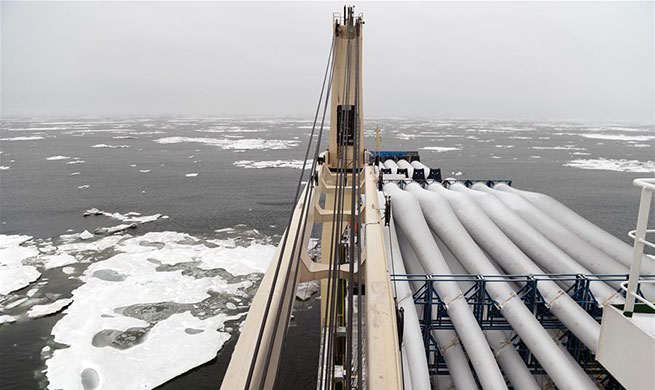GAZA, Aug. 20 (Xinhua) -- One day ahead of Eid al-Adha, or Festival of Sacrifice, markets in the Palestinian Gaza Strip were packed with various kinds of commodities, but shoppers did not show up.
"I see the goods at the market, but I have no money to buy anything for my family. I cannot even buy a pair of socks for my children," Tareq Abu Jabal, a Gaza resident, told Xinhua.
The 40-year-old man, who used to be a construction worker, said he has been jobless for 11 years due to the Israeli blockade imposed on the seaside territory, which is ruled by Islamic Hamas movement.
Shops and vendors sell new cloths and candies while the demand is acutely weak.
Eid al-Adha is celebrated by Muslims worldwide in memory of Prophet Abraham's deed of nearly sacrificing his own son as ordered by God.
It comes at the end of the pilgrimage rituals in Saudi Arabia as Muslims slaughter sheep, goats, camels or calves as means of getting closer to God.
Traditionally, buying new cloths for children and sweets to serve visiting relatives is a regular habit to mark this occasion.
But people in Gaza complain that they cannot afford buying the feast needs as all prices have skyrocketed, with notable increase in poverty and unemployment rate caused by the Israeli blockade which has been in place since 2007.
Nihad al-Nashar, a Gaza housewife in her 50s, said she only bought basic needs in addition to very limited amounts of pancakes and sweets for the feast.
The lady added that her husband could barely meet the basic needs of his large family amid the deteriorating economic conditions in Gaza.
"This feast is different from previous ones," the woman said. "Despite the Israeli blockade, salary cuts and the worsening economic conditions, we will celebrate the Adha feast."
Gaza has been placed under a tight Israeli blockade since Hamas movement seized the territory by force after routing forces loyal to President Mahmoud Abbas in 2007.
The blockade has pushed Gaza's 2 million people deeper into poverty as economists in Gaza warned that extreme poverty exceeded 50 percent in 2017 compared with 37 percent in 2011.
In addition to the blockade, the coastal enclave also suffered from a political division caused by Hamas' violent takeover of Gaza, which had been engaged in three major wars with Israel that claimed the lives of thousands.
According to the Palestinian Central Bureau of Statistics, unemployment rate in Gaza Strip reached 53.7 percent compared with 19.1 percent in the West Bank.
Ongoing salary cuts in government employees have added harm to the injury.
The market recession also delivered a heavy blow to merchants who cannot sell out their goods.
To avoid losses and increase sales, traders offer discounts that may reach up to 50 percent to attract buyers, but it is still not helpful.
The situation is getting worse every year and the difference between this year and last year's sales is big, said Kamal al-Reefy, a candy seller.
Al-Reefy said that economic situation last year was way better than this year as civil servants received complete salaries and prices of goods were cheaper.

















